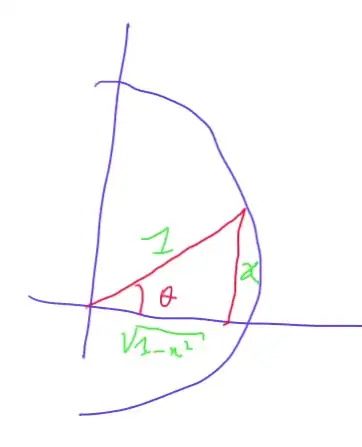My question is how would I prove the following problem. Im not sure how I would begin. $$\arcsin x=\arctan\frac{x}{\sqrt{1-x^2}},|x|<1$$
-
This is (to some extent) related: http://math.stackexchange.com/questions/254561/proof-of-arctanx-arcsinx-sqrt1x2 – Martin Sleziak Oct 05 '15 at 10:56
4 Answers
A draw is also very good :-)
You can see that $\theta=\arcsin(x)$. But you also have that $$\tan\theta=\frac{x}{\sqrt{1-x^2}}\implies \theta=\arctan\left(\frac{x}{\sqrt{1-x^2}}\right)$$ what prove the claim. By the way, you can also deduce that $$\theta=\arccos(\sqrt{1-x^2})=\arcsin(x)=\arctan\left(\frac{x}{\sqrt{1-x^2}}\right).$$
- 55,662
Usually, when trying to prove function equalities in calculus, you may follow the following procedure:
Define $f(x)$, so that what you are going to prove is $f(x)=0$. 5 sO in your case let $f(x) = \arcsin(x) - \arctan(\frac{x}{\sqrt{1-x^2}})$ .
Compute $f'(x)$ and try to show $f'(x)=0$. Then your $f(x) $ is constant. (and this is the case in your question)
Calculate $f(a)$ for some $a$ in the domain you have, to find that $f(a)=0$, and as $f$ is constant, then $f(x)=0$ for all $x$ in your domain. (in your case try $f(0)$).
- 53,687
- 2,782
-
3.) Is not very clear ! it's enough to find $f(a)$ and get $f(x)=f(a)$ for all $x$. – Surb Oct 05 '15 at 09:38
-
@Surb yes, since you show in 2° that the derivative is zero, so your function is constant, i.e. $ f(x)=c $ for some c constant, and thus $ f(a)=c $ also – Nizar Oct 05 '15 at 09:40
HINT:
$$\dfrac{d(\arctan x/\sqrt{1-x^2})}{dx}$$
$$=\dfrac1{1+x^2/(1-x^2)}\left(\dfrac1{\sqrt{1-x^2}}-\dfrac12\dfrac x{(1-x^2)^{3/2}}(-2x)\right)$$
$$=\dfrac{(1-x^2)(1-x^2+x^2)}{(1-x^2+x^2)(1-x^2)^{3/2}}=?$$
- 274,582
Note that $$\arcsin (X)=\alpha$$ means simply that $$\sin \alpha=X$$ and $$\arctan (Y)=\alpha$$ means $$\tan \alpha=Y$$ so your equation means: $$ \tan \alpha=\dfrac{\sin \alpha}{\sqrt{1-\sin^2 \alpha}}= \dfrac{\sin \alpha}{\cos \alpha} $$
- 62,675
